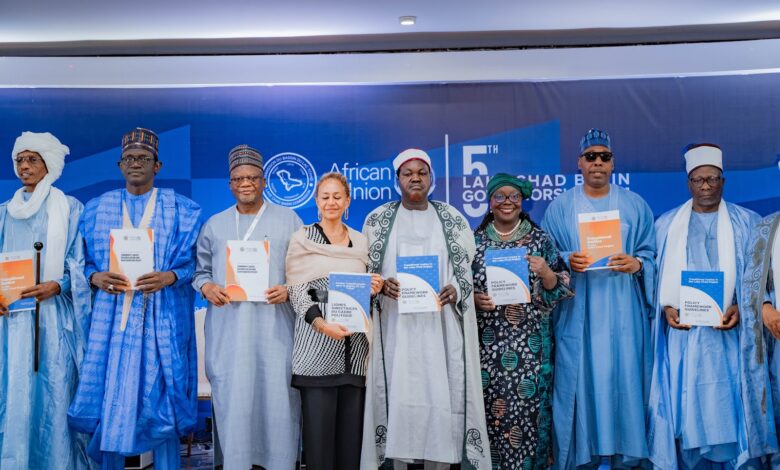Lake Chad Basin Governors’ Forum Highlights Persistent Security Threats and the Struggle for Stability
Despite ongoing efforts to stabilise the Lake Chad Basin, home to four neighbouring countries, persistent challenges continue to undermine security and peace in the region. The 5th Lake Chad Basin Governors’ Forum recognised both the progress made and the pressing obstacles that still hinder lasting stability.

The Lake Chad Basin, which straddles four neighbouring countries—Chad, Cameroon, Niger, and Nigeria—continues to grapple with numerous challenges that undermine the region’s stability, despite ongoing efforts to stabilise the area. The 5th Lake Chad Basin Governors’ Forum, held from January 27 to 31 in Maiduguri, Borno State, northeastern Nigeria, brought together eight governors from the region, key leaders, development partners, and civil society representatives to address these pressing issues.
The forum’s discussions centred around the persistent security threats posed by Boko Haram and Islamic State West Africa Province (ISWAP), the worsening humanitarian crisis, and the region’s vulnerability to climate change. The shrinking of Lake Chad, a critical water source, was of particular concern due to climate change and unsustainable water management. The lake’s diminishing size has devastated agriculture, fishing, and local livelihoods, deepening the region’s socio-economic vulnerabilities.
Despite military successes by the Multinational Joint Task Force (MNJTF) against Boko Haram and ISWAP, remnants of these groups continue to launch attacks around the Lake Chad islands, where limited government presence and logistical challenges make security coordination difficult. The forum underscored the urgent need for stronger transborder security measures to secure these vulnerable areas.
“The LCB Governors’ Forum recognises and commends the substantial achievements made under the Regional Strategy for Stabilisation, Recovery, and Resilience of the areas affected by Boko Haram in the Lake Chad Basin Region (RS SRR), which have significantly contributed to stabilisation, peace, and sustainable development in the Lake Chad Basin region,” the forum noted in its communiqué.
However, the forum also highlighted setbacks, including the suspension of donor support for Niger’s National Window of the Regional Stabilisation Facility (RSF). The lack of financial resources could slow peacebuilding efforts, particularly reintegration, reconciliation, and community resilience programmes. If not addressed, funding gaps could undo the progress made in countering violent extremism and stabilising conflict-affected communities.
It also noted the rising illicit arms trade, drug trafficking, and the radicalisation of youth, all of which compound insecurity in the region. The lack of economic opportunities remains a key driver of instability. In response, the forum called for more investment in cross-border trade, infrastructure, and climate-resilient economic programmes to address these underlying issues.
Climate change was identified as another major obstacle, with droughts, desertification, and water scarcity intensifying economic hardships and forcing them to resort to desperate survival strategies, including joining armed groups. The forum advocated for expanded environmental protection initiatives, climate adaptation programmes, and rehabilitating the shrinking Lake Chad ecosystem, which sustains millions of livelihoods.
The communiqué identified local governance and traditional leaders’ role as vital in bridging security gaps and fostering reconciliation. It urged the government authorities to strengthen partnerships with traditional rulers, civil society, and community-based organisations to enhance local trust and facilitate reintegration.
Despite the daunting challenges, the forum reaffirmed its commitment to strengthening regional cooperation, improving security coordination, and mobilising sustainable funding mechanisms. Two new policy documents, the Transitional Justice in the Lake Chad Basin and Community-Based Reconciliation and Reintegration Policy, were launched, focusing on social cohesion, community rehabilitation, and the reintegration of former combatants.
As Niger was announced as the host for the following forum, the need for coordinated policies and cross-border cooperation was emphasised to address both insecurity and development challenges. The participating governors, including Mai Mala Buni of Yobe State (Nigeria), Babagana Umara Zulum of Borno State (Nigeria), Ahmadu Umaru Fintiri of Adamawa State (Nigeria), Lidjima Abdraman of Hadjer-Lamis (Chad), Mohamadou Ibrahim of Diffa (Niger), Midjiyawa Bakari of the North Region (Cameroon), Abate Edi’i Jean of the North Region (Cameroon), and Saleh Haggar Tidjani of the Province of Lac (Chad), reaffirmed their commitment to peace-building and sustainable development initiatives.
The forum reinforced its dedication to strengthening regional cooperation, enhancing security coordination, and mobilising sustainable funding mechanisms. However, the road to stabilisation remains riddled with obstacles, requiring urgent, coordinated efforts from national governments, regional bodies, and international partners.
The 5th Lake Chad Basin Governors' Forum, held in Maiduguri, Nigeria, focused on tackling persistent issues like security threats from Boko Haram and ISWAP, climate change, and humanitarian crises.
Despite military gains, insecurity persists due to logistical challenges and limited government presence, necessitating stronger transborder security measures. The forum emphasized the critical need for economic investments and climate adaptation to mitigate youth radicalization and instability.
The forum acknowledged progress made through the Regional Strategy for Stabilisation, Recovery, and Resilience but raised concerns over funding cuts that could impede peacebuilding efforts.
It advocated for enhancing partnerships with traditional and local governance to bolster trust and reconciliation. The introduction of new policies on transitional justice and community-based reintegration highlights the focus on social cohesion and reintegrating former combatants.
Continued regional coordination and cooperation were underscored as vital for addressing the basin's complex challenges.
Support Our Journalism
There are millions of ordinary people affected by conflict in Africa whose stories are missing in the mainstream media. HumAngle is determined to tell those challenging and under-reported stories, hoping that the people impacted by these conflicts will find the safety and security they deserve.
To ensure that we continue to provide public service coverage, we have a small favour to ask you. We want you to be part of our journalistic endeavour by contributing a token to us.
Your donation will further promote a robust, free, and independent media.
Donate HereStay Closer To The Stories That Matter




